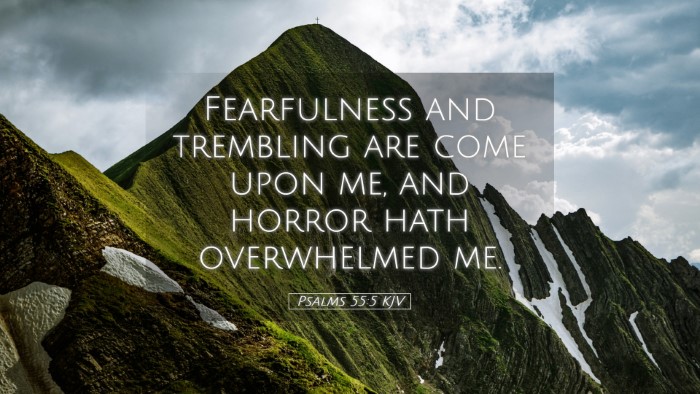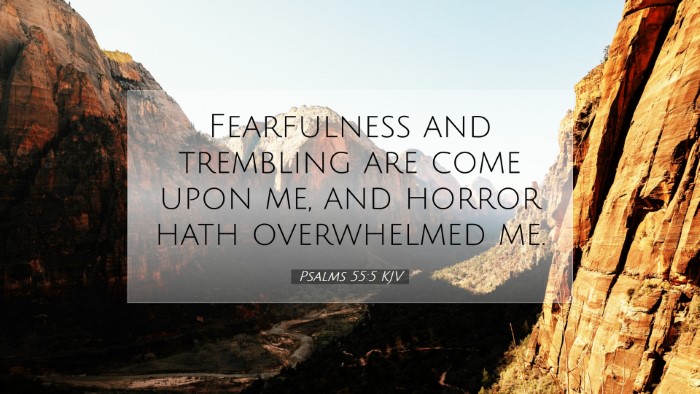Psalms 55:5 - Commentary and Insights
“Fearfulness and trembling are come upon me, and horror hath overwhelmed me.” - Psalms 55:5
Introduction
This verse from Psalm 55 presents a profound emotional landscape that resonates with many believers facing trials. The Psalmist expresses feelings of dread and overwhelming fear, which reflect the broader human experience of anxiety and despair. To grasp the depth of this verse, we can explore insights from notable public domain commentaries by Matthew Henry, Albert Barnes, and Adam Clarke.
Matthew Henry's Commentary
Matthew Henry elaborates on the emotional turbulence experienced by the Psalmist. He notes that the “fearfulness and trembling” depict a state of inner turmoil that can arise from various sources, including external threats and internal doubts. Henry emphasizes that such feelings are common among believers who face significant challenges.
- The Weight of Fear: The sense of horror mentioned reflects a paralyzing fear that strips one of peace and courage.
- Human Vulnerability: Henry points out that recognizing our frailty in the face of fear is vital. The Psalmist does not shy away from admitting his fears, which is an essential step toward seeking divine assistance.
- Call for Divine Help: This verse serves as an impetus for prayer and reliance on God’s strength in moments of fear. Henry stresses that acknowledging our fears is the first step to casting them upon the Lord.
Albert Barnes' Commentary
Albert Barnes provides a detailed analysis of the psychological aspects of the Psalmist's experience. He suggests that the terms used to describe fear and horror indicate both mental anguish and a profound sense of vulnerability.
- Spiritual Context: Barnes highlights the spiritual implications of fear, suggesting that it can arise when one is distant from God or grappling with sin. The emotional upheaval can lead to feelings of abandonment, reinforcing the need for a close connection to the divine.
- Consequences of Betrayal: The context of Psalm 55 involves feelings of betrayal, likely from friends or allies. Barnes notes that such betrayal can intensify feelings of fear and despair, leading to a greater reliance on God for comfort and resolution.
- Encouragement to Seek Refuge: Barnes encourages believers to seek refuge in God during times of fear. He argues that in moments of distress, it is crucial to remember God's faithfulness and provision.
Adam Clarke's Commentary
Adam Clarke delves into the emotions described in this verse, correlating them with the experiences of individual believers. He elaborates on how the Psalmist voices deep anguish, portraying a desperate plea for understanding and deliverance.
- Complexity of Emotions: Clarke asserts that fear, trembling, and horror represent a complex emotional state that can occur simultaneously. This intricacy underscores the human experience and the need for divine intervention.
- Historical Context: Clarke often emphasizes historical context, noting that this psalm was likely written during a time of significant personal crisis for David. Understanding the background adds depth to the emotions portrayed.
- Hope Amidst Despair: Despite the somber tone, Clarke ultimately points to a glimmer of hope. He encourages believers to look beyond their immediate fears and trust in God’s eventual deliverance.
Theological Reflections
The emotive language of Psalm 55:5 serves as a reminder of the human condition in relation to God. It invites theological reflection on several key themes:
- The Nature of Fear: The psalmist’s fear reflects a profound human reality. Theological discourse often explores God’s sovereignty in the midst of our fears.
- The Call to Lament: This verse exemplifies the practice of lament in Scripture. It encourages believers to articulate their fears and struggles honestly before God.
- Divine Presence in Fear: The repeated theme across commentaries is the assurance of God's presence even when we experience fear and horror. This encourages a proactive faith that seeks God amidst trials.
Practical Application
For pastors and scholars, Psalm 55:5 presents a unique opportunity for application within congregational life:
- Pastoral Care: Understanding the depth of fear and anxiety can inform pastoral counseling, allowing for the provision of practical and spiritual support to congregants.
- Preaching Laments: Incorporating lament into worship services can help congregants express their fears and struggles in a communal and healing manner.
- Prayer Focus: Encouraging prayer ministries to focus on fear and anxiety can cultivate an atmosphere of reliance on God and spiritual encouragement.
Conclusion
Psalms 55:5 captures the essence of human vulnerability against the backdrop of divine strength. The insights from Matthew Henry, Albert Barnes, and Adam Clarke shed light on the deeper implications of this verse, offering comfort and hope. It invites believers to confront their fears openly and seek God’s intervention, reminding us that even in our darkest moments, we are not alone.


